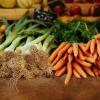News
Displaying Results 1 - 25 of 36
Central Asia is well placed to produce fresh and dried fruit and vegetables. Countries like Kyrgyzstan, Tajikistan, and Uzbekistan are important producers of dried fruit, in particular apricots. However, traders from the region have been facing challenges with diversifying their export portfolios…
In an important move to secure the supply of essential raw materials, the European Critical Raw Materials Act (CRMA) entered into force on 23 May 2024. This legislation is a cornerstone in enhancing the EU's capabilities in sourcing, processing, and recycling critical raw materials (CRMs), which…
The European Commission has proposed a new legislation, the European Critical Raw Materials Act, to ensure a secure and sustainable supply of critical raw materials for the EU. The Act, on which the European Parliament and the European Council reached a provisional agreement on 13 November,…
The Asia-Pacific region is home to some of the world's largest and most diverse reserves of minerals, energy, water, and biomass. The region accounts for around 70% of global mining production and consumption, including most of the world's bauxite, copper, iron, nickel, silver, tin, and zinc. …
The Republic of Moldova is almost entirely dependent on energy imports as it has no domestic sources of fossil fuels and makes only limited use of its renewable energy potential. At the same time, the energy intensity in the country is 3.4 times higher than the average energy intensity in the…
The Norwegian Government has issued a Mineral Strategy which necessitates the Geological Survey of Norway to produce an inventory aligned with the United Nations Framework Classification for Resources (UNFC).
UNFC will be crucial in this strategy as it will be used to classify mineral resources…
While underground coal mining in Albania stopped almost wholly (except for two private mines with a very insignificant output) more than 15 years ago, the abandonment of the mines from the 1990s onwards with no proper plans for closure has left a legacy of risks. These include water contamination,…
As the global economy emerges from the COVID-19 pandemic and governments strengthen efforts to “build-back-better”, trade as an engine of growth has re-emerged in policy agendas. For developing countries and countries with economies in transition that are still in the process of accession to the…
For many people around the world, the work and achievements of the United Nations remain in the realms of grand summits of heads of state on pressing global issues, of diplomatic brokering of peace agreements, of urgent humanitarian interventions for people in the greatest need, and other high-…
The mandatory wearing of safety-belts in cars first introduced in Europe at the turn of the 1970s has saved millions of lives around the world in the past 50 years.
According to the World Health Organization, the use of safety-belts by occupants of vehicles in front seats reduces the risk of…
Representatives from Kazakhstan, Kyrgyzstan, Tajikistan, and Uzbekistan met at the United Nations Economic Commission for Europe (UNECE) to discuss ways to unlock the resource potential and promote a sustainable future in Central Asia. The meeting was part of the UNECE Resource Management Week 2023…
Picture your favorite tree-lined street or childhood park. Now picture it without trees. Would it be the same?
On 30 March, at the Regional Forum for Sustainable Development, UNECE debuted the short film “Why Trees?”, which invites us to reflect on our human connection with the trees around us.…
Adopted in 1963, the UNECE Standard S-1 concerning the certification and commercial quality control of seed potatoes provides a framework for the international trade of seed potatoes. It is currently the only international standard that ensures that seed potatoes meet specific and harmonized…
Electrification of vehicles is an important tool to align the transport sector with a climate neutral future and achievement of the Sustainable Development Goals (SDGs). Focused on climate actions, this year’s annual session of UNECE’s Inland Transport Committee (ITC) agreed on dedicated actions to…
Participants in the motor industry’s complex supply chains, regulators as well as investors seeking to invest sustainably are increasingly interested in considering the carbon footprint of vehicles over their entire lifetime - from material extraction and production to manufacturing, use and…
In the past years, Central Asia has been facing major climate-change related challenges – drought, floods, desertification, sandstorms, extreme cold and heat spells – and many more. Not only have these affected rural areas, but cities have been suffering, too. Accentuated by increased traffic…
In the face of rising prices of food and energy, and the persistence of the climate crisis, the sustainability of food systems is an issue of increasing global attention. While meat production provides an essential source of nutrition, and an important source of income for farmers, its impact on…
Governments, Mayors, leading architects, urbanists and experts will gather in San Marino on 3-6 October 2022 for the 83rd session of the UNECE Committee on Urban Development, Housing and Land Management. The session will support regional exchange of experiences and good practices to promote…
The extreme heat and drought that the region experienced this summer is a bleak reminder that current commitments under the Paris Agreement and those made last year at COP26 are nowhere near what is needed to limit global warming to below 1.5°C. Inaction is a policy choice that will lead to greater…
July is a month to start enjoying the harvest of fruits and vegetables for many in Europe and the topic of reducing food loss and waste becomes very urgent. In Serbia, agriculture is an important sector of the economy, contributing around 6% of GDP. In March 2022 food production accounted for 10.4…
Regional seas and coastal ecosystems, located either entirely or partly within the UNECE region, face growing environmental pressures caused by climate change, the increasing pollution loads, tourism, fishing, mining of minerals, and energy production (such as offshore wind power plants). These…
Cities, which are already responsible for around 75% of global CO2 emissions, are also at the forefront of fighting climate change and simultaneously are particularly vulnerable to its impacts. Urban trees and forests have been highlighted as a solution that can help to achieve the SDGs and make…
We probably all know what a potato is and how we prefer to eat it. But do you know what a seed potato is, and why seed potato certification matters? And did you know UNECE has a standard for seed potatoes?
Potatoes is one of the easiest vegetables to grow, as old potatoes that have grown buds can…
COP26 was a positive step forward in the fight against climate change, but as the UN Secretary General pointed out in his comments: “it is not enough. We must accelerate climate action to keep alive the goal of limiting the global temperature rise to 1.5 degrees.” The compromise deal reflects the…
Policymakers looking for innovative solutions to global problems are increasingly recognizing that the answers have been around for a long time even before the earth got populated by humans. Trees can help achieve pressing global objectives for sustainable development, biodiversity conservation,…


























